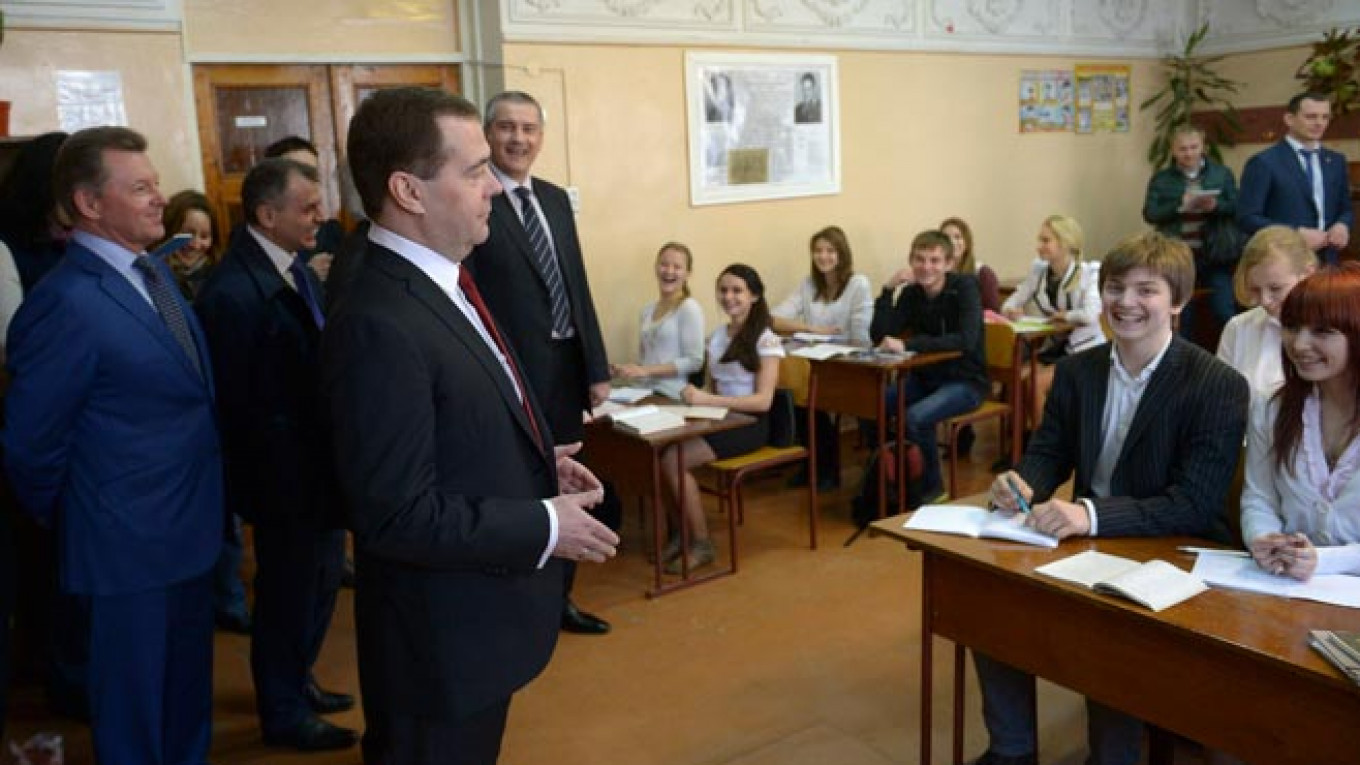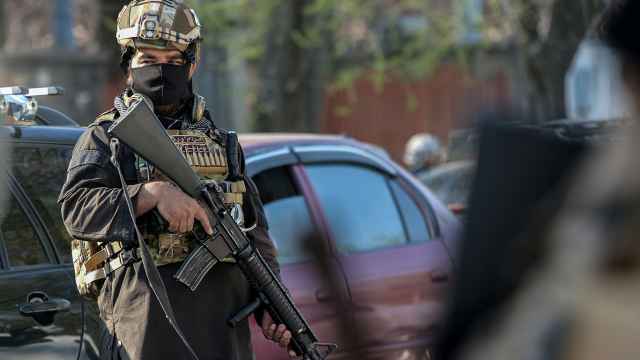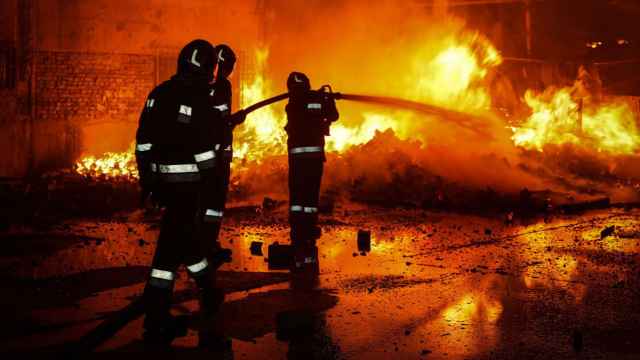Prime Minister Dmitry Medvedev on Monday paid a visit to Crimea in an apparent bid to fortify Russia's control of the region.
Russia's takeover of Crimea earlier this month and its military maneuvers along the Ukrainian border have been severely criticized by Ukrainian authorities and the West, which has imposed sanctions on Russian officials and businessmen as punishment for the moves.
The issue has been the focus of ongoing high-level talks between Russia, the European Union and the U.S., with the Kremlin pushing to federalize Ukraine, and the West refusing to recognize the annexation of Crimea and calling for a pullback of Russian troops from the border.
Medvedev, who was accompanied by a group of ministers for his visit to Crimea on Monday, promised to inject money into education, health care, infrastructure, salaries and pensions in the region.
"People expect us to create conditions for a calm and respectable life, confidence in tomorrow, the sense of belonging to a strong country," he said.
"We must meet these expectations."
Medvedev also said that a ministry for Crimean affairs had been created, and Deputy Economic Development Minister Oleg Savelyov had been appointed as its head.
Ukrainian authorities strongly condemned Medvedev's visit.
"Ukraine's Foreign Ministry, in its note to the Russian Federation, strongly protested and stated that the visit of an official to the territory of another state without preliminary agreement is a crude violation of the rules of the international community," ministry spokesman Evhen Perebiynis said.
Medvedev's visit to the peninsula followed negotiations over the Crimea crisis in Paris between U.S. Secretary of State John Kerry and Russian Foreign Minister Sergei Lavrov late Sunday. Following that meeting, Kerry said that he and Lavrov had agreed that the crisis should be resolved diplomatically.
Apart from that, it seems both sides continued to butt heads and push for different things. Kerry urged Russia to withdraw its troops from the border with Ukraine, criticizing the "climate of fear and intimidation in Ukraine" that they were creating and echoing earlier appeals from U.S. President Barack Obama. Western leaders have repeatedly expressed concerns after Russia amassed tens of thousands of troops along the border with Ukraine, and critics have accused the Kremlin of either trying to intimidate Ukraine or invade it.
On Monday, however, an official at Ukraine's Defense Ministry said that the number of Russian troops along the border had in fact decreased, though it was unclear whether it was tied to Kerry's comments.
The Ukrainian official, Oleksandr Rozmaznin, said the decrease could have just been a rotation of conscripts rather than withdrawal.
A representative of Russia's Defense Ministry later confirmed the information of withdrawal of troops, saying that a motorized infantry battalion was being pulled back from the border, Interfax reported.
The reports came days after CNN cited U.S. intelligence sources as saying that a Russian invasion of southeastern Ukraine was becoming increasingly likely, putting European and Western leaders on edge.
Russia has repeatedly denied any intention to interfere in mainland Ukraine militarily, however.
But it has not stopped short of trying to influence the country in other ways. On Sunday, Lavrov reiterated Russia's proposal that Ukraine become a federation, saying that Ukraine cannot be a unitary state and should be a loose federation of regions able to opt for different economic, linguistic and religious models.
"The west, east and south [of Ukraine] espouse contradictory values and, to make the country function as a unified state, one should find a consensus and compromise between all Ukrainian regions without exception," he said.
The Kremlin has argued that Ukraine should be a federation because of its linguistic and cultural diversity, with the residents of its western and eastern regions speaking Ukrainian and Russian, respectively.
Kerry said, however, that the idea of a federation had not been discussed in any serious way during his meeting with Lavrov "because it would have been inappropriate to do so without Ukrainian input."
Ukraine's Foreign Ministry, for its part, lashed out at the Kremlin over its federalization proposals, asking why federalism is not being introduced in Russia and why Ukrainian — which is spoken by millions of people in Russia — has not become a state language there.
Russia, which is formally a federation, has been accused by critics of not practicing what it preaches and being effectively a highly centralized unitary state.
"Under the barrels of their assault rifles, this aggressor demands only one thing — the total capitulation of Ukraine, its disintegration and the destruction of the Ukrainian state," the ministry said. "There is no need to teach others. It is better to put things in order in your own state," the statement said.
Ukraine's acting President Oleksandr Turchynov and tycoon Petro Poroshenko, the leading candidate in the upcoming May 25 presidential election, rejected the idea of federalization on Monday.
"There are no preconditions for federalization today," Turchynov said, adding that "Ukraine is a unitary state."
Some analysts said that the reason the Kremlin wanted federalization was to destabilize the situation in Ukraine.
Ukrainian political analyst Vitaly Bala said that the aim of the proposal was to weaken and decentralize Ukraine and bring its eastern regions into Russia's orbit. In the framework of a federation, some Ukrainian regions would have the right of legislative initiative and could hold referendums on joining Russia, following Crimea's example, he added.
"Such referendums are possible if backed by people with assault rifles," he said.
Alexei Garan, head of the Kyiv-Mohyla Academy's Political Analysis School, expressed a similar sentiment, saying that Russia was sending agent provocateurs to eastern Ukraine and organizing pro-Russian rallies there in order to destabilize the situation.
Ukraine's security service also warned of presumed Russian provocations on Monday, saying that it had detained in Kiev a leader of the Eurasian Youth Alliance, a right-wing Russian group, who was allegedly planning to seize the buildings of the Supreme Rada and the Cabinet. The agency said that he had hired up to 200 people for the purpose and had brought baseball bats and prepared Molotov cocktails.
Garan compared what he said was Russia's interference in Ukraine's domestic affairs to Hitler determining the internal structure of Czechoslovakia.
In a similar vein, German Finance Minister Wolfgang Schaeuble said Monday that Russia's moves against Ukraine were reminiscent of Hitler's annexation of German-speaking regions of Czechoslovakia in 1938, Reuters reported.
Contact the author at o.sukhov@imedia.ru
A Message from The Moscow Times:
Dear readers,
We are facing unprecedented challenges. Russia's Prosecutor General's Office has designated The Moscow Times as an "undesirable" organization, criminalizing our work and putting our staff at risk of prosecution. This follows our earlier unjust labeling as a "foreign agent."
These actions are direct attempts to silence independent journalism in Russia. The authorities claim our work "discredits the decisions of the Russian leadership." We see things differently: we strive to provide accurate, unbiased reporting on Russia.
We, the journalists of The Moscow Times, refuse to be silenced. But to continue our work, we need your help.
Your support, no matter how small, makes a world of difference. If you can, please support us monthly starting from just $2. It's quick to set up, and every contribution makes a significant impact.
By supporting The Moscow Times, you're defending open, independent journalism in the face of repression. Thank you for standing with us.
Remind me later.






